情态动词语法讲解PPT课件
合集下载
情态动词全部ppt课件

16
Some festivals are held to satisfy the ancestors, who might return either to help or to do harm.
推测
17
--- Excuse me. Is this the right way to the Summer Palace?
3. will/would
1. 表示意愿,will表示现在的意愿, would表示过去的意愿。
I will stick to my plan though all of you are against it.
I told him to give up smoking, but he wouldn’t
3. During the vacation, he would visit me
every four days.
过去的习惯
4. Will / Would you pass me the ball,
please?
请求
习惯,倾向 5. Birds will fly to the south in the winter. 24
You can go with them if you like.
--- Could/Can I have a look at your new design? --- Yes, of course you can.
(注意此处答语不能用could)
8
3)用在肯定句中,表示_客__观__上__有__可_ 能 Anybody can make mistakes. Driving on the snowy roads can be very dangerous.
Some festivals are held to satisfy the ancestors, who might return either to help or to do harm.
推测
17
--- Excuse me. Is this the right way to the Summer Palace?
3. will/would
1. 表示意愿,will表示现在的意愿, would表示过去的意愿。
I will stick to my plan though all of you are against it.
I told him to give up smoking, but he wouldn’t
3. During the vacation, he would visit me
every four days.
过去的习惯
4. Will / Would you pass me the ball,
please?
请求
习惯,倾向 5. Birds will fly to the south in the winter. 24
You can go with them if you like.
--- Could/Can I have a look at your new design? --- Yes, of course you can.
(注意此处答语不能用could)
8
3)用在肯定句中,表示_客__观__上__有__可_ 能 Anybody can make mistakes. Driving on the snowy roads can be very dangerous.
小学语法课件-情态动词can (共34张PPT) 全国通用
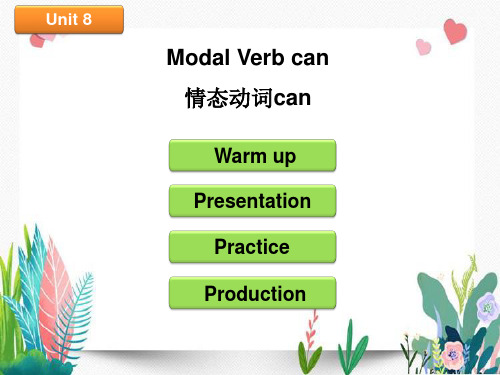
The little boy can read books in English. 一般疑问句: Can the little boy read books in English? 肯定回答: Yes, he can. 否定回答: No, he can’t. 否定句: The little boy can read books in English.
Presentation Sentences
He can’t be at home. 他不可能在家。 Can he come here today, please? 请问他今天能来这里吗?
can在句中表示可能,常用于否定句或疑问句中,指某种 可能性。
Practice 变换句型
Oral Practice
Presentation Sentences
Bats can sleep during the day and fly during the night. Bats can’t swim. Can bats make special sounds? What can bats do?
Cows can give us milk. Cows can’t run fast. Can cows give us beef? What can cows do?
I can dance. 我会跳舞。
2. 否定句:主语+can’t+动词原形+其他 I can’t dance. 我不会跳舞。
3. 一般疑问句及回答:Can+主语+动词原形+其他? — Can you dance? 你会跳舞吗? — Yes, I can. / No, I can’t. 是的,我会。/不,我不会。
情态动词讲解精ppt课件

例句
will/would
详细描述:will 表示现在的意愿或 预测,would 表示过去的或虚拟 的意愿或预测。
1. I will help you with your project.(我会帮助你完成你的项 目。)
总结词:表示意愿或预测
例句
2. They would have gone to the party if they had known about it earlier.(如果他们早点 知道,他们就会去参加聚会。)
表示意愿
情态动词+动词原形,如 would like to go,表示 某人想要去。
形式变化
基本形式
情态动词的基本形式包括 现在时、过去时和将来时 。
过去式
情态动词的过去式通常是 在基本形式后面加-d或ed,如could have done 、should have done等。
将来时
情态动词的将来时通常是 在基本形式后面加-will或shall,如will be able to 、shall have to等。
may与might的区别与联系
总结词
may表示现在的许可或可能性;might表示过去的可能性或许可。
详细描述
may用于肯定句中,表示许可或可能性,例如“You may use this room.”(你可以使用这个房间。 )“The book may be in the library.”(这本书可能在图书馆里。)might表示过去的可能性,常 用于过去时态的句子中,例如“He might come tomorrow.”(他明天可能来。)
未必、很难说
She might not agree with us.
表示虚拟语气
will/would
详细描述:will 表示现在的意愿或 预测,would 表示过去的或虚拟 的意愿或预测。
1. I will help you with your project.(我会帮助你完成你的项 目。)
总结词:表示意愿或预测
例句
2. They would have gone to the party if they had known about it earlier.(如果他们早点 知道,他们就会去参加聚会。)
表示意愿
情态动词+动词原形,如 would like to go,表示 某人想要去。
形式变化
基本形式
情态动词的基本形式包括 现在时、过去时和将来时 。
过去式
情态动词的过去式通常是 在基本形式后面加-d或ed,如could have done 、should have done等。
将来时
情态动词的将来时通常是 在基本形式后面加-will或shall,如will be able to 、shall have to等。
may与might的区别与联系
总结词
may表示现在的许可或可能性;might表示过去的可能性或许可。
详细描述
may用于肯定句中,表示许可或可能性,例如“You may use this room.”(你可以使用这个房间。 )“The book may be in the library.”(这本书可能在图书馆里。)might表示过去的可能性,常 用于过去时态的句子中,例如“He might come tomorrow.”(他明天可能来。)
未必、很难说
She might not agree with us.
表示虚拟语气
《情态动词》PPT课件
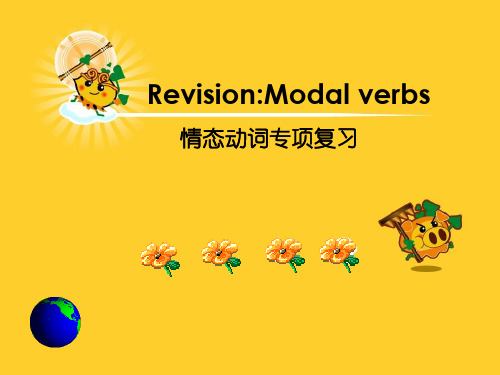
work our this problem. 如果你睡个好觉,那么你就能做出这个题目。 3、表示过去的能力: could表示过去一般的能力, 但不表示做或未做某事;
was/ were able to表示过去有能力并且成功地做了某事, 相当于managed to do something/ succeeded in doing something;
• Mr. Bush is on time for everything. How can it be that he was late for the opening ceremony? (表疑惑、惊讶)
表示请求、允许、允诺
1. 当对方是决策者时,你代表你(们)自己(I, We),或代表第三者(he,she,they)向对方 (you)请示或提出建议时用:
Revision:Modal verbs
情态动词专项复习
How many modal verbs
do you remember?
(情态动词)
一,常见的情态动词有:can, could, may, might ,must, shall, should, will, would, need, have to等
4、具有情态动词的某些特征的有:have(had) to, used to.
情态动词的特征
1、有一定的词义,但不能单独作谓语,它们要和行 为动词或连系动词连用,构成谓语。
2、适用于主语的各种人称和数 have to例外,主语 是第三人称单数时,要用has to)。如:
We/ He must work hard. 我们/他一定要努力工作。 I have to walk home. 我得步行回家。 He has to walk home. 他得步行回家。
was/ were able to表示过去有能力并且成功地做了某事, 相当于managed to do something/ succeeded in doing something;
• Mr. Bush is on time for everything. How can it be that he was late for the opening ceremony? (表疑惑、惊讶)
表示请求、允许、允诺
1. 当对方是决策者时,你代表你(们)自己(I, We),或代表第三者(he,she,they)向对方 (you)请示或提出建议时用:
Revision:Modal verbs
情态动词专项复习
How many modal verbs
do you remember?
(情态动词)
一,常见的情态动词有:can, could, may, might ,must, shall, should, will, would, need, have to等
4、具有情态动词的某些特征的有:have(had) to, used to.
情态动词的特征
1、有一定的词义,但不能单独作谓语,它们要和行 为动词或连系动词连用,构成谓语。
2、适用于主语的各种人称和数 have to例外,主语 是第三人称单数时,要用has to)。如:
We/ He must work hard. 我们/他一定要努力工作。 I have to walk home. 我得步行回家。 He has to walk home. 他得步行回家。
情态动词(17张PPT)初中英语专项复习课件

情态动词表推测也是每年中考的重点,以考查can’t 和must为主,主要在单项选择中考查不同情态动词的辨 析。考生在解答此类试题时,可以从以下几方面着手: ①表示否定的推测:一是断然的否定,此类题一般是考 查情态动词表推测的用法,语境会对所填空给出解释, 据 此 可 以 判 断 是 非 常 肯 定 的 否 定 , 此 时 最 好 用 cannot /can’t;二是表示不能十分肯定或拿不准,此类题一般 也会有相关的语境提示,如I’m not sure、who knows等 ,此时最好用may或might。
表示需要、必须,主 要用于否定句和疑问 句中。needn’t常用 于回答must表请求的 否定回答
—Must I finish my homework now?我必 须现在完成我的家庭作 业吗? —No, you needn’t. 不, 你不需要。
注意 (1) must和have/has to均意为“必须”,常可互 换使用。但have/has to是用于强调客观需要,意为 “必须, 不得不”;must用于表示主观看法, 意为“ 必须, 应该”。如:We’ll have to ask Zhang Hong. 我们必须去问张红了。 We must work hard at school. 在学校我们必须 努力学习。
情态动词本身有一定的意义,但不能独立作谓语, 没有人称和数的变化,后面必须接动词原形。常见的情 态动词有:may, must, need, have to 等,具体用法见下表 :
情态动词
用法
例句
表示能力,意为 Sam can speak English well.
can “能,会”
山姆英语讲得很好。
He could have gone home. 他可能已回家了。
表示需要、必须,主 要用于否定句和疑问 句中。needn’t常用 于回答must表请求的 否定回答
—Must I finish my homework now?我必 须现在完成我的家庭作 业吗? —No, you needn’t. 不, 你不需要。
注意 (1) must和have/has to均意为“必须”,常可互 换使用。但have/has to是用于强调客观需要,意为 “必须, 不得不”;must用于表示主观看法, 意为“ 必须, 应该”。如:We’ll have to ask Zhang Hong. 我们必须去问张红了。 We must work hard at school. 在学校我们必须 努力学习。
情态动词本身有一定的意义,但不能独立作谓语, 没有人称和数的变化,后面必须接动词原形。常见的情 态动词有:may, must, need, have to 等,具体用法见下表 :
情态动词
用法
例句
表示能力,意为 Sam can speak English well.
can “能,会”
山姆英语讲得很好。
He could have gone home. 他可能已回家了。
我的公开课情态动词课件

2. —What’s the name of the book? —Khulaifi. _________ I spell it for you? A. Shall B. Would C. Can D. Might
情态动词表必要性
• must • need
高考真题演练
must 表“必须”
mustn’t 禁止
A. might B. must C. would D. can
3. What do you mean, there are only ten tickets? There ______ be twelve.
A. should B. would C. will D. shall
4. It is usually warm in my hometown in March, but it _____ be rather cold sometimes.
1. 不必须
don’t have to needn’t do
don’t need to
2. must还可表示“偏偏、偏要” e.g. Must you make so much noise?
• You ___ buy a gift, but you can if you want to.
• must
1. 常用于否定句或疑问句。 e.g. You can’t be hungry already — you had
lunch only two hours ago!
2. can用于肯定句中表示理论上的可能性,并不 牵涉是否真的会发生
e.g. You can hurt yourself if you play in the street.
A. must B. can C. should D. would
情态动词-完整版PPT课件
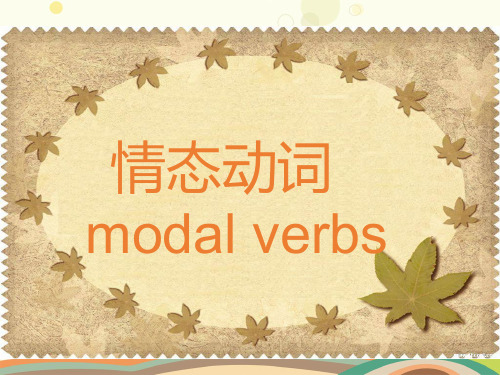
情态动词 modal verbs
1.情态动词的用法特点
1)情态动词 除 ought 和 have 外,后面只能 接不带to 的不定式。 2)情态动词没有人称,数的变化,即情态动 词第三人称单数不加-s。 3)情态动词没有非谓语形式,即没有不定式, 分词等形式。
can could may might shall should must will would ought to
have to dare need used to
表示推测
情态动词
不表示推测
2.表示推测——情态动词的重要用法.
情态动词
对将来
对现在
对过去
m肯ust/定sho的uld 推测
+ V. + V. + have done
常见must be + be doi定的推测 can’t, couldn’t
疑问的推测
can, could
+ V.
+ V.
+ have done
+ be doing
可以用not表示“可能不”
+V.
+ V.
+ have done
+ be doing
+ V.
+ V.
+ have done
+ be doing
不同的“肯定”程度可按下列层次排列: He is at home. (事实) He must be at home.(非常肯定的推断) He ought to be at home.(很可能) He could be at home.(很可能) He may be at home.(仅仅可能而已) He might be at home.(或许, 非常不确定) He might not be at home.(也许不在家) He may not be at home. (比might可能) He couldn’t be at home.(很可能不在家) He can’t be at home.(一定不在家)
1.情态动词的用法特点
1)情态动词 除 ought 和 have 外,后面只能 接不带to 的不定式。 2)情态动词没有人称,数的变化,即情态动 词第三人称单数不加-s。 3)情态动词没有非谓语形式,即没有不定式, 分词等形式。
can could may might shall should must will would ought to
have to dare need used to
表示推测
情态动词
不表示推测
2.表示推测——情态动词的重要用法.
情态动词
对将来
对现在
对过去
m肯ust/定sho的uld 推测
+ V. + V. + have done
常见must be + be doi定的推测 can’t, couldn’t
疑问的推测
can, could
+ V.
+ V.
+ have done
+ be doing
可以用not表示“可能不”
+V.
+ V.
+ have done
+ be doing
+ V.
+ V.
+ have done
+ be doing
不同的“肯定”程度可按下列层次排列: He is at home. (事实) He must be at home.(非常肯定的推断) He ought to be at home.(很可能) He could be at home.(很可能) He may be at home.(仅仅可能而已) He might be at home.(或许, 非常不确定) He might not be at home.(也许不在家) He may not be at home. (比might可能) He couldn’t be at home.(很可能不在家) He can’t be at home.(一定不在家)
情态动词(12张PPT)初中英语专项复习课件

例句
可能性
The storybook could be Jim’s. He likes reading
小
could 很可能 stories.这本故事书很可能是吉姆的,他喜欢读故
事。
This book must be Lucy’s, for her name is on the must 一定 cover.这本书一定是露西的,因为封面上有她的名 大
态 动
had better 最好,用来提出建议
today.
词
情态动词的基本含义
分析近三年中考真题可知,情态动词的基本用法是中考必考点,考生需 掌握各个情态动词的基本含义(见"考点帮")。
在答题时,应注意结合语境,并考虑常见句型。 常考情态动词有can、may和must及情态动词的否定形式needn’t、
基 本 句
②可能,也许,表示推
They might laugh at me.
型
might 测
情
态 动 词
常 见 情
①必须,表示命令或主观 看法
—Must I finish the homework today? —No, you needn’t/don’t have to. He must be staying here.
基
①能,会,表示能力
I can sing.
本
②可能,表示推测,常用于否定句和疑 Can it be right?
句
问句
型
can ③可以,表示许可和征求对方意见
Can you help me?
情
①能,会,can的过去式,表 I could do it.
态
常
过去的能力
情态动词讲解ppt课件共33页35页PPT

情态动词讲解ppt课件共33页
11、获得的成功越大,就越令人高兴 。野心 是使人 勤奋的 原因, 节制使 人枯萎 。 12、不问收获,只问耕耘。如同种树 ,先有 根茎, 再有枝 叶,尔 后花实 ,好好 劳动, 不要想 太多, 那样只 会使人 胆孝懒 惰,因 为不实 践,甚 至不接 触社会 ,难道 你是野 人。(名 言网) 13、不怕,不悔(虽然只有四个字,但 常看常 新。 14、我在心里默默地为每一个人祝福 。我爱 自己, 我用清 洁与节 制来珍 惜我的 身体, 我用智 慧和知 识充实 我的头 脑。 15、这世上的一切都借希望而完成。 农夫不 会播下 一粒玉 米,如 果他不 曾希望 它长成 种籽; 单身汉 不会娶 妻,如 果他不 曾希望 有小孩 ;商人 或手艺 人不会 工作, 如果他 不曾希 望因此 而有收 益。-- 马钉路 德。
46、我们若已接受最坏的,就再没有什么损失。——卡耐基 47、书到用时方恨少、事非经过不知难识各个时代的伟大智者。——史美尔斯 49、熟读唐诗三百首,不会作诗也会吟。——孙洙 50、谁和我一样用功,谁就会和我一样成功。——莫扎特
高考英语情态动词课件(共21张PPT)
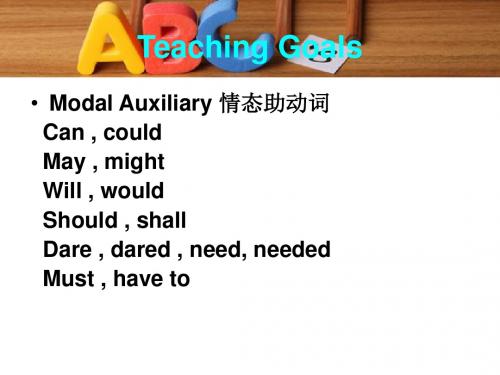
He shall get his money.
5)Should 表示说话人的惊奇、愤怒、失望等特殊情感 It’s surprising that Mary should love such a person as Jack. It’s strange that … It’s unthinkable that … I’m sorry that…
肯定疑问 Dare we run? 句
Do we dare (to) run?
否定疑问 Dare he not run? Doesn’t he dare to run ? 句
Need, needed
Need /needed
1、情态动词用于否定句,疑问句 He needn’t worry about it.
This will be the house you're looking for .
Will , would
5)would常用于虚拟条件句,表示与事实相反或不太可能实现的情况 But for your help we would have been late .
6) Would 表示过去的习惯性动作或某人的一典型动作,又使人厌烦的感 觉。 He would go swimming in summer when he was in the countryside.
3.表示请求和允许,与may同义,相当于be allowed to.常用语口语中。 You can smoke in this room. Could I borrow you dictionary?
Can , could
4.用于一些固定句型 a. Cannot ( can never) …too…怎么也不过分
如询问某种可能时,应用can。 He must know my address. (一定) He can’t know my address. (一定不) Can he know my address? (询问可能性)
5)Should 表示说话人的惊奇、愤怒、失望等特殊情感 It’s surprising that Mary should love such a person as Jack. It’s strange that … It’s unthinkable that … I’m sorry that…
肯定疑问 Dare we run? 句
Do we dare (to) run?
否定疑问 Dare he not run? Doesn’t he dare to run ? 句
Need, needed
Need /needed
1、情态动词用于否定句,疑问句 He needn’t worry about it.
This will be the house you're looking for .
Will , would
5)would常用于虚拟条件句,表示与事实相反或不太可能实现的情况 But for your help we would have been late .
6) Would 表示过去的习惯性动作或某人的一典型动作,又使人厌烦的感 觉。 He would go swimming in summer when he was in the countryside.
3.表示请求和允许,与may同义,相当于be allowed to.常用语口语中。 You can smoke in this room. Could I borrow you dictionary?
Can , could
4.用于一些固定句型 a. Cannot ( can never) …too…怎么也不过分
如询问某种可能时,应用can。 He must know my address. (一定) He can’t know my address. (一定不) Can he know my address? (询问可能性)
情态动词语法讲解课件PPT
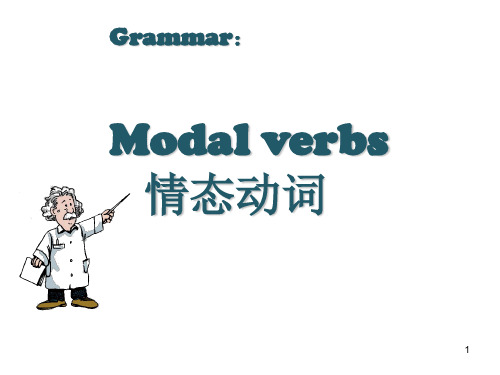
9
b)表示“可能”,可用may, might, can, could
may/might:
1.既可以表示现在的可能,也可表示将来 的可能,might在口气上比may更委婉
• 现在:It may/might be true. • 将来:He may/might leave tomorrow.
2.在疑问句中,用can,不用may。 • Can they have missed the bus? • Yes, they may have.
10
may not重音落在助动词上,表示 “不可能”,重音落在否定词上,表 示“不许可” , 比较:
•He may not go tomorrow. •He may not go tomorrow.
•所以在书面语中,表示“不可能” 常用can’t
11
can/could表示现在的可能,口气上 could比较委婉
2表示“许可”和“不许”
a)请求对方“许可”可用can, could, may, might.
may/might较正式,could/might较委婉
表示给予“许可”通常用can/may,而不用 could/might
Could I use your phone? Yes, of course you can. Might I trouble you for a light? You may indeed.
without a dictionary.
• I talked a long time, and in the end managed to make her believe me. 在否定句中,could既可以表示过去一般能 力,也可表示过去某具体事情的能力. • I couldn’t/wasn’t able to play the piano when I was at school.
b)表示“可能”,可用may, might, can, could
may/might:
1.既可以表示现在的可能,也可表示将来 的可能,might在口气上比may更委婉
• 现在:It may/might be true. • 将来:He may/might leave tomorrow.
2.在疑问句中,用can,不用may。 • Can they have missed the bus? • Yes, they may have.
10
may not重音落在助动词上,表示 “不可能”,重音落在否定词上,表 示“不许可” , 比较:
•He may not go tomorrow. •He may not go tomorrow.
•所以在书面语中,表示“不可能” 常用can’t
11
can/could表示现在的可能,口气上 could比较委婉
2表示“许可”和“不许”
a)请求对方“许可”可用can, could, may, might.
may/might较正式,could/might较委婉
表示给予“许可”通常用can/may,而不用 could/might
Could I use your phone? Yes, of course you can. Might I trouble you for a light? You may indeed.
without a dictionary.
• I talked a long time, and in the end managed to make her believe me. 在否定句中,could既可以表示过去一般能 力,也可表示过去某具体事情的能力. • I couldn’t/wasn’t able to play the piano when I was at school.
be动词、助动词、情态动词用法课件(35张)

翻译题2
他喜欢在周末看电影。
翻译题3
她还没有完成作业。
06
总结与回顾
本课程重点回顾
be动词
情态动词
be动词是英语中最基本的动词之一, 用于表示主语的状态或存在。常用的 be动词有am、is、are、was、were 等。
情态动词表示说话人的语气和态度, 如可能、应该、必须等。常用的情态 动词有can、could、may、might、 shall、should、will、would等。
表示进行
表示完成
表示可能性
表示必要性
I am reading a book. ( 我正在读书。)
I have finished the work. (我已经完成了工
作。row. (他们明天可
能不会来。)
We should go shopping now. (我们
学习目标
掌握be动词的用法, 包括现在时、过去时 、将来时的表达方式
学习情态动词的用法 ,如can、may、 must等,并了解其 区别和用法
理解助动词在句子中 的作用,如do、 does、did等
02
Be动词的用法
定义与功能
定义
be动词是英语中最基本的动词之 一,用于表示主语的状态或特征 。
be动词、助动词、 情态动词用法课件 (ppt35张)
目 录
• 引言 • Be动词的用法 • 助动词的用法 • 情态动词的用法 • 练习与巩固 • 总结与回顾
01
引言
课程介绍
01
02
03
课程名称
be动词、助动词、情态动 词用法
适用对象
英语学习者,特别是中学 生和大学生
课程目标
掌握be动词、助动词、情 态动词的基本用法,提高 英语语言表达能力
他喜欢在周末看电影。
翻译题3
她还没有完成作业。
06
总结与回顾
本课程重点回顾
be动词
情态动词
be动词是英语中最基本的动词之一, 用于表示主语的状态或存在。常用的 be动词有am、is、are、was、were 等。
情态动词表示说话人的语气和态度, 如可能、应该、必须等。常用的情态 动词有can、could、may、might、 shall、should、will、would等。
表示进行
表示完成
表示可能性
表示必要性
I am reading a book. ( 我正在读书。)
I have finished the work. (我已经完成了工
作。row. (他们明天可
能不会来。)
We should go shopping now. (我们
学习目标
掌握be动词的用法, 包括现在时、过去时 、将来时的表达方式
学习情态动词的用法 ,如can、may、 must等,并了解其 区别和用法
理解助动词在句子中 的作用,如do、 does、did等
02
Be动词的用法
定义与功能
定义
be动词是英语中最基本的动词之 一,用于表示主语的状态或特征 。
be动词、助动词、 情态动词用法课件 (ppt35张)
目 录
• 引言 • Be动词的用法 • 助动词的用法 • 情态动词的用法 • 练习与巩固 • 总结与回顾
01
引言
课程介绍
01
02
03
课程名称
be动词、助动词、情态动 词用法
适用对象
英语学习者,特别是中学 生和大学生
课程目标
掌握be动词、助动词、情 态动词的基本用法,提高 英语语言表达能力
高中英语情态动词各种用法课件(共47张PPT)

一 、表能力 :表现在的或一般的能力:表示 现在的或一般的能力用can 或 be able to. 一 般的能力是指你无论什么时候做什么事情就 能做到的能力。表示现在的能力或一般的能 力时,can比be able to 更普遍。
A computer can’t think for itself; it must be told what to do. (表示一般的能力)
This can’t / couldn’t be done by him. (表示不 相信)
He could be on his way home now. (could 不 如 may / might常用)
Can this be done by him? (表示一种疑惑、 惊讶)
(3)would, could, should, might 并不一定 与过去的时间有关,而是表示可能性弱于他 们相应的现在形式。如:
do something / succeeded in doing sth.
The fire spread through the hotel very
quickly but everyone was able to get out. (过去有能力并成功地做了某事)
(3) could have + 过去分词,表示过去有 能力做但未做。
表示对过去已经发生的行为进行推测,意为 “想必 / 准是/ 一定做了某事
It must have rained last night, for the road was quite muddy.
The lights were out. They must have been asleep.
2. can have done
相关主题
- 1、下载文档前请自行甄别文档内容的完整性,平台不提供额外的编辑、内容补充、找答案等附加服务。
- 2、"仅部分预览"的文档,不可在线预览部分如存在完整性等问题,可反馈申请退款(可完整预览的文档不适用该条件!)。
- 3、如文档侵犯您的权益,请联系客服反馈,我们会尽快为您处理(人工客服工作时间:9:00-18:30)。
• I talked a long time, and in the end managed to make her believe me.
在否定句中,could既可以表示过去一般能 力,也可表示过去某具体事情的能力.
• I couldn’t/wasn’t able to play the piano when I was at school.
• Can they have missed the bus?
• Yes, they may have.
may not重音落在助动词上,表示 “不可能”,重音落在否定词上,表 示“不许可” , 比较:
•He may not go tomorrow.
•He may not go tomorrow.
•所以在书面语中,表示“不可能” 常用can’t
2表示“许可”和“不许”
a)请求对方“许可”可用can, could, may, might.
may/might较正式,could/might较委婉
表示给予“许可”通常用can/may,而不用 could/might
Could I use your phone? Yes, of course you can. Might I trouble you for a light? You may indeed.
应该 意愿 敢 需要 不得不
+ 动词原形
肯定
can could may might must should
否定
缩写否定
can not can’t
could not couldn’t
may not
/
might not mightn’t
must not mustn’t
should not shouldn’t
can/could表示现在的可能,口气上 could比较委婉
That’s not mine. Whose can it be? It could be John’s.
can常用于否定句和疑问句,而 could不受此限。
If you don’t have a guide, you could lose your way. It can’t/couldn’t be true. Can/could the news be true?
She can’t/couldn’t have missed the train.
“might/could +have done ”可以表示本来 可能发生但没有发生的,或者本来可能完成 却没有完成的动作,
You might have finished the work last week.
I could have passed the examination, but I failed.
现在“能力”:can, be able to
• As I have got enough money, I can/am able to help her.
Caห้องสมุดไป่ตู้:
1.某桩具体事情:eg.I can climb this cliff. 2.泛指一般的“能力”: • He can drive a car. • She can’t play the piano.
need need not needn’t
一、情态意义表示法
1.表示“能力”和“可能”
a)表示“能力”,可用can, could, be able to can既能表示现在的能力,也表示将来的 能力。 Eg.Look! I can do it.
I can’t do it now, but I can do it later.
将来“能力”:
•通常 will/shall be able to
• I’ll be able to speak German in another two months
•具体某事:can
• Can you go and see him tomorrow morning? • If I can, I will do it.
b)表示“可能”,可用may, might,
can, could
may/might:
1.既可以表示现在的可能,也可表示将来 的可能,might在口气上比may更委婉
• 现在:It may/might be true. • 将来:He may/might leave tomorrow.
2.在疑问句中,用can,不用may。
• Mr Reed looks pale. He may be ill.
“may/might +have done/have been doing”,“can/could +have done”表示过去 的可能。
He may/might have missed the train.
She may/might have been expressing her true feelings at that moment.
Grammar:
Modal verbs 情态动词
情态动词(modal verbs):
表示说话人的语气或情态,如请求、命令、 愿望、能力以及可能性等。英语的情态动词 有:
can/could may/might must
shall/should will/would
need have to
能够 可能 必须
过去“能力”: could, was/were
able to
肯定句:
•Could:一般能力
• She could play the piano when she was only six.
• was/were able to(及managed to):具体 事件
• He was able to translate the article without a dictionary.
在肯定陈述句中,may与can的比较:
Can指逻辑上的可能性,may指事实上 的可能性
• The road can be blocked.(按逻辑可能会堵,)
•The road may be blocked.(可能现在正堵着,事 实上)
• Mr Reed is in poor health. He can be ill at any time.
